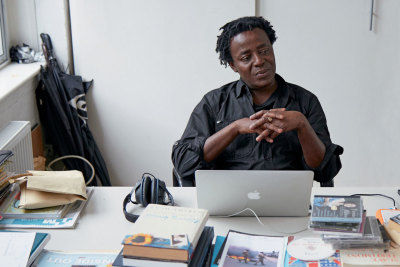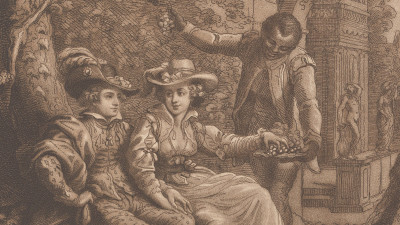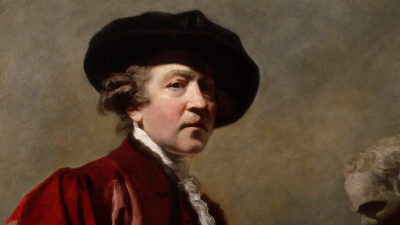
Sir John Akomfrah RA, Mnemosyne, 2010.
© The Artist. © Photo: Royal Academy of Arts, London.
This image is not available to download. To licence this image for commercial purposes, contact our Picture Library at picturelibrary@royalacademy.org.uk
Mnemosyne, 2010
Sir John Akomfrah RA (b. 1957)
RA Collection: Art
The title of Sir John Akomfrah's film - Mnemosyne - refers to the mother of the Nine Muses and the personification of Memory in Greek mythology. The film is also known as 'The Nine Muses' and features a tone poem composed of a series of verses named after Mnemosyne and her daughters: Tragedy (Melpomene), History (Clio), Music (Euterpe), Sacred Song (Polyhymnia), Astronomy (Urania), Comedy (Thalia), Erotic Love (Erato), Dance (Terpsichore) and Epic Poetry (Calliope).
Akomfrah created this film as part of the BBC/Arts Council 'Made in England' project, using archival material to retell the experience of post-war immigrants to the UK. Mnemosyne focuses on the West Midlands between 1960 and the 1980s and makes use of archival images of the area punctuated by scenes of a frozen wasteland. The soundtrack mixes music with voiceovers of literary texts (by Homer, Milton, Dante, Shakespeare, Emily Dickinson, James Joyce and Samuel Beckett) read by a variery of actors with differing accents. Homer's Odyssey serves as the master text to which the film returns while showing migrants disembarking from large vessels. The film has been described as 'an evocative bricolage which questions memory and suggests the possibility for endless re-interpretation of historical events' and 'a set of imaginary journeys through myth, folklore, history and a museum of intangible things' (quotations from the Lisson Gallery).
In an interview on Mnemosyne in the Guardian, Akomfrah described his methodology of reinterpreting and reusing footage originally captured for different purposes. He states: "It's important to read images in the archive for their ambiguity and open-endedness...Migrants were often filmed in relation to debates about crime or social problems, so that's how they get fixed in official memory. But that Caribbean woman standing in a 60s factory isn't thinking about how she's a migrant or a burden on the British state; she's as likely to be thinking about what she's going to eat that evening or about her lover." (Guardian interview, link below)
Akomfrah co-founded the Black Audio Film Collective in 1982 with a group of friends. Their first film was Handsworth Songs in 1986, a documentary exploring the events surrounding the 1985 riots in Birmingham and London through archive footage, still photos and newsreel. The film won several international prizes and established the multi-layered visual style that has become a motif of Akomfrah’s practice.
Further reading:
https://www.independent.co.uk/arts-entertainment/films/reviews/the-nine-muses-john-akomfrah-92-mins-pg-6292730.html
https://www.theguardian.com/film/2012/jan/20/john-akomfrah-migration-memory
Object details
Start exploring the RA Collection
- Explore art works, paint-smeared palettes, scribbled letters and more...
- Artists and architects have run the RA for 250 years.
Our Collection is a record of them.



